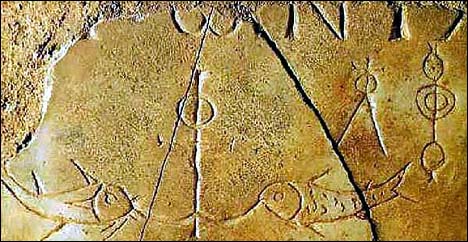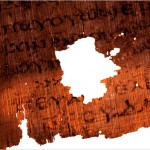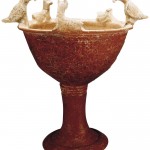The below is a helpful little post by Larry Hurtado about the Jewishness of Paul. I have a couple of caveats with it, namely Paul says he as a Jew has a choice about being the Jew to the Jew (1 Cor. 9). He no longer sees Torah observation as an obligation even for Jewish Christian like himself. He can either do it, or not do. He is no longer under the yoke of Torah, and what Paul does say is that the Mosaic covenant was temporary, and was eclipsed by the new covenant which is viewed as a fulfillment of the Abrahamic covenant (Gal. 4). So, keeping Torah was an option but not an obligation in Paul’s view, even for Jewish Christians. In this he undoubtedly would have disagreed with some Jerusalem Christians, perhaps even with James. In Paul’s view, a requirement for Jews like Peter or himself to continue to keep kosher would divide the Christian community, and in Galatians he makes clear he sees that as unacceptable. Thus on the question of circumcision, he doesn’t think it much matters in Christ, but as a witness to Jews, he may have agreed to have his son (if he ever had one) circumcised. In short, I think Larry in what follows underestimates the radicality of Paul.
——
Would Paul Have Circumcised His Son?
by larryhurtado
In the course of explaining in his prologue why he bracketed Paul out of the discussion in his book, The Birth of Christianity (HarperCollins, 1998), John Dominic Crossan makes one of his characteristically punchy statements: “But, to put it bluntly and practically, if Paul had had a son, he would not have circumcised him” (xxv). In reading this years ago, my own immediate response was the opposite. Moreover, over the last fifteen years I’ve often asked colleagues in NT/Christian Origins how they would respond to the question: Would Paul have circumcised his son? And the response overwhelmingly has been “Yes, of course!” (So, as I often said to students, I may be wrong, but I’m not idiosyncratic!)
The larger issue pithily put in Crossan’s memorable statement is what continuing place Torah may have had in Paul’s view as “apostle to the gentiles.” As I read Paul, his critical comments about Torah are typically in the context of refuting those fellow Jewish believers who thought that gentile believers should take up Torah-observance fully (i.e., effectively, become Jewish proselytes) as a requisite part of their conversion, in addition to faith in Jesus. So, e.g., his discussion of Torah in Galatians seems to me clearly in this context.
Paul does also bemoan the many fellow Jews who rejected Jesus in the name of Torah, and acted (ignorantly in his view) as if Torah-observance continued to be the sufficient basis of a relationship with God (esp. Romans 10:1-4). Certainly (Paul held), now that Jesus the Messiah has come, it is not possible to be “justified in God’s sight by deeds of the Law” (Rom. 3:20). For now, “apart from the Law, the righteousness of God has been disclosed” in Jesus (Rom. 3:21ff.), and he is now the revelation that must be acknowledged in trust/faith.
But in other statements the same Paul affirms Torah as a genuine revelation of God. For example, he asks (rhetorically) does this new development (Jesus) “overthrow the law”? And his immediate response is “Absolutely not!” (Rom. 3:31).
So, Paul vigorously opposed the demand that gentile believes must adopt Jewish Torah-observance as a condition for their salvation. But what did he likely hold with regard to Jewish believers? So far as I can tell, Paul had no problem with fellow Jewish believers remaining Jews, and that includes remaining Jewish in observing Torah as a marker of their Jewish identity. So long as they didn’t treat Torah-observance as a universal requisite of believers, it was OK for Jewish believers. So far as being part of God’s redeemed people is concerned, especially so far as gentile believers are concerned, “neither circumcision nor uncircumcision is anything” (Gal. 6:15).
But does this mean that Paul was guilty of the charge ascribed to some zealous Jewish believers in Jerusalem that Paul taught “Jews living among the Gentiles to forsake Moses, and that you tell them not to circumcise their children or observe the customs” (Acts 21:21)? I doubt it. I can’t find any Pauline text in which Paul addresses fellow Jews and tells them to “forsake Moses” and the Torah.
Instead, in passages such as Romans 14 Paul seems to treat with equanimity fellow believers who do or do not observe customs that appear to be expressions of Torah. (And, as commentators typically note, Paul’s use of “weak” and “strong” in this chapter is likely ironic, reflecting the outlook of some in Rome who thought of themselves as “strong”.) And, it’s interesting that Acts claims that Paul did have Timothy circumcised (Acts 16:1-3; because his mother was Jewish, an early witness to the view expressed later in rabbinic texts that Jewish descent is traced through the mother).
So, in my view (and contra Dom’s), if Paul, the apostle to the gentiles, had married (a nice Jewish woman) and had a son, I am pretty sure that he would have had him circumcised. As I’ve noted before, Paul’s readiness to undergo repeated synagogue floggings is a strong indication that he continued to feel strongly his Jewishness, and was willing to pay with his own flesh to remain a member of his ancestral people.













